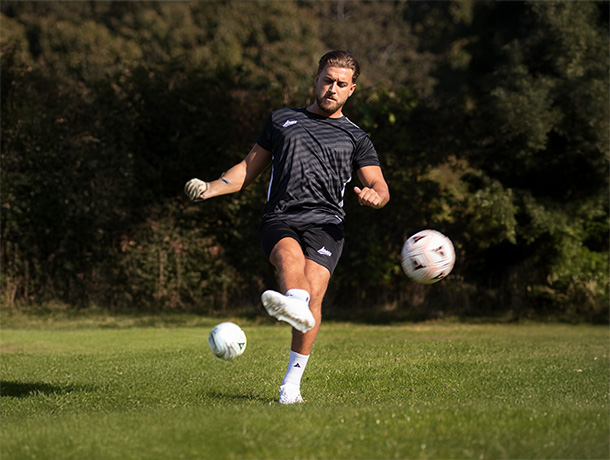
How to start a career in football
For many of us, working in an industry you’re passionate about is a dream come true. Often, waking up and getting to pursue your hobby full-time is considered the perfect career, and the football industry is no different, boasting a wide range of fantastic opportunities and jobs for aspiring pro players.
From coaching to managing, if you love this popular sport and dream of making it your career then there are a few things you should know before you start dipping your toes into the professional world. In this blog, we are going to take you through how to kickstart your career in the football industry, sharing advice, tips and the kinds of jobs you can apply to secure your path to success.
How hard is it to become a professional footballer?
As you’d expect, going pro in the world of football isn't easy and you will have to put both your skills and dedication to the test. However, it’s not impossible and many have achieved it before, with the right ambition and mindset, you could do it too.
To take action and realise your dreams you have to actively search for ways to be seen, continually improve your own skill set through regular practice and take steps to get yourself into the world of professional football. For pro players, many start at a relatively young age, playing at school, joining local clubs and enrolling into academies. A lot of professional footballers start honing their skills early on to help them stand out and ensure they are of an elite standard before adulthood. However, while this is the case for many footballers, some successful players started later in life and through determination and grit were able to work their way into the industry without this head start.
With that being said, being a pro footballer is not the only job you can take in the industry, so if you’re looking to get into the sport later on in life there are other options available to you, such as being a team coach or commentator.
How to get into football
There’s a lot of hard work and dedication ahead of anyone looking to become a professional footballer. l. It’s not enough to just play with your friends, you have to make sure you’re showing off your skills to the right people. If you’re wondering how to become a footballer, then keep reading as we have included our top tips and ideas for getting started in the industry.
Join an apprenticeship
Some premier league clubs offer apprenticeships and this is a great way of dipping your toes into the world of professional football and learning about all the skills that come along with it. You’ll have the chance to learn from the people already in the industry and you can apply the skills you’ve learned to help you stand out in future football jobs and applications.
Join a football team
While it may seem an obvious step in the journey to becoming a professional, joining a football team is important, so we had to include it. As we’ve said above, it’s simply not enough to just play with friends and family, any career should be taken seriously and joining a football team can actually have benefits that many overlook. This includes being able to play alongside and against other skilled players and getting feedback from a trained football coach to help you grow. It will also guarantee regular football practise and increase your chances of being seen by a talent scout.
Find a football coach
Becoming a professional footballer can’t be done alone. You need someone who’s been in the industry for a while and can give you constructive feedback to help you become a strong player. If you’re looking to go pro, having a professional coach is a must.
Professional coaches are experienced in shaping and guiding talented footballers to help you hone your skills in a way that meets the criteria of what talent scouts are looking for. If you’re ever unsure of the next steps or what areas you need to improve, a coach will be able to help and guide you towards your dream career with their skills and experience.
Working on your skills at home
To go pro, you’ll need to make sure you’re keeping on top of your workouts and practises outside of your clubs and coaches. If your coach has pointed out a weak spot in your training then going home and working on it is the fastest way to grow your skills to a professional level.
If you’re going to be training at home then you’ll need to make sure you have the right kit to help keep you on track. For example, a trusty football that can meet your needs while you hone your skills such as this Pro Player Football that has been crafted to meet the needs of all footballers. It makes a great companion for those who are looking to get some at-home training around their regime.

PRO PLAYER FOOTBALL - HYPER BLUE
Just like in training you’ll need to make sure you stay comfortable and cool while training at home, you don’t want bad kit getting in the way of your progression. We would recommend this Evolve Pro 3 jersey that has been engineered to support your training. The quick-dry fabric helps to improve ventilation and help regulate body temperature so you can train for longer with a kit that keeps you in top form.

If you want more ideas for training at home then you can read our blog on how to practise football at home for more information and tips on training alone.
Eat healthy and exercise
Whether you’re joining a team or an academy, a vital part of going pro is ensuring you’re in peak physical health. This includes sticking to a healthy and balanced diet and doing regular exercise such as swimming, running and weight training. This will help prove to potential scouts that you’re serious and working hard outside of practise as well as supporting your football training.
Staying motivated and dedicated
Having an abundance of motivation and dedication is essential to propelling you towards becoming a professional football player. While having these virtues alone won’t guarantee your dream job position, without them many aspiring players give up when times get tough.
There will be times when your motivation and dedication are challenged and often, the small, day-in day-out challenges represent the true test. Those who believe in their goals and can keep themselves motivated during tough times will be able to push past and reach their goals.
Prepare to get scouted
After finding a reliable coach, building your skills and joining a team or apprenticeship to build a good reputation for yourself, you’ll want to start thinking about catching the attention of football talent scouts. This can be a daunting yet exciting task which requires some forethought. You’ll need to put a portfolio showcasing your achievements and skills, and you may also want to ask your coach to write you a letter of personal recommendation on top of this to go along with your portfolio as this will help you be taken more seriously.
What jobs can you get working in football?
While many who think of a football career automatically assume that means being a famous premier league football player, there are many other career tracks you can take in this field. Many of these jobs can include options such as:
- Local club managers - This job will be great for those who like the business side of football and are great at problem-solving.
- Physiotherapists - For those interested in the recovery/medical side of football
- Dieticians - For those interested in the nutrition side of football
- PR - For those who are interested in upholding club reputations, this job is great for natural communicators and creative individuals.
- Sales and marketing - perfect for the more number and tactical-driven people. This side of football careers will be best for those who are great with communication and love social media.
- Event management - If you’re interested in planning and scheduling then the event management side of football will be the best fit for you. It’ll require someone who’s organised, and great at problem-solving and budgeting.
- Player welfare - This job requires someone with empathy and patience, it’s the perfect career choice for those who are interested in the psychological side of football or perhaps those who are interested in supporting players mentally as well as physically.
- Coaching - If you’d rather guide players than be the one getting guided then this job is great for team leaders who have plenty of experience and are great at giving tailored advice.
- Security - perfect for those who have great observational and conflict-resolving skills. This football career will require quick thinkers who are experienced in calming situations and communication.
- Photography and videography - For those who are interested in the creative marketing side of football and know their way around a camera.
A lot of these jobs can be achieved through degrees that will provide you with the right skills and can often be found at your football local clubs or online.
Get on track for a career in football with superior kit.
All professional footballers have started from somewhere, whether it’s joining a team or starting an apprenticeship, and while there may be a long road ahead of you, ensuring you have the right equipment to support your training will help make your journey a lot easier.
Here at Avec Sport, we have a wide range of football teamwear jerseys, shorts and more, to help you stand out and keep you comfortable for optimal performance both during training on match days to support your journey and goals.

